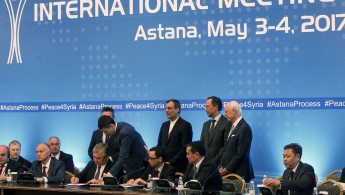Russia, Turkey, Iran ink deal on Syria 'safe zones'
The heads of the delegations, representing the three countries sponsoring peace talks in Astana, signed the document on the second day of the negotiations in Kazakhtan’s capital.
"Over the past two days, the participants in the Astana talks reviewed the implementation of the ceasefire agreement and the cessation of hostilities," Kazakhstan's foreign minister Kairat Abdrakhmanov said of a frail truce brokered by Moscow and Ankara in December.
"As a result the guarantor countries agreed to sign a memorandum on the creation of de-escalation zones in Syria."
Meanwhile, a member of the rebel delegation – which like the Syrian government is not a signatory – left the room, shouting against regime ally Iran, an AFP reporter confirmed.
The Kremlin has been touting a plan to create safe zones in Syria that is aimed to "further pacification and cessation of hostilities."
An Arabic-language version of the Russian draft proposal calls for the creation of "de-escalation zones" in rebel-held territory in the northwestern province of Idlib, in parts of Homs province in the centre, in the south, and in the opposition enclave of Eastern Ghouta near Damascus.
The aim is to "put an immediate end to the violence" and "provide the conditions for the safe, voluntary return of refugees" as well as the immediate delivery of relief supplies and medical aid, the document said.
But issues including which countries could police any safe zones remain unclear.
On Wednesday, Russian President Vladimir Putin said that ways to monitor the zones would be an issue for separate talks.
Boosting ceasefire
Earlier on Thursday, Syrian rebels said that they had resumed participation in the talks after having suspended their involvement a day earlier over airstrikes against civilians.
After talks with Turkey counterpart Recep Tayyip Erdogan on Wednesday, Russian President Vladimir Putin said the safe zones were meant to lead to "further pacification and cessation of hostilities."
He also said the proposed zones would also be no-fly areas if fighting on the ground there stopped entirely.
The Kremlin's plan echoes calls by US leader Donald Trump to establish safe zones in Syria.
Putin said that "as far I could tell" the US leader broadly supported the idea in a phone call they held on Tuesday.
Erdogan said in comments published on Thursday that Moscow's plan to set up these zones in Syria would solve the six-year conflict by"50 percent".
Damascus supports the Russian plan, Syrian state news agency SANA reported.
More than 320,000 people have been killed in Syria since the country's war began with anti-government protests in March 2011.





 Follow the Middle East's top stories in English at The New Arab on Google News
Follow the Middle East's top stories in English at The New Arab on Google News
![Israeli forces ordered bombed Gaza's Jabalia, ordering residents to leave [Getty]](/sites/default/files/styles/image_330x185/public/2176418030.jpeg?h=a5f2f23a&itok=_YGZaP1z)

